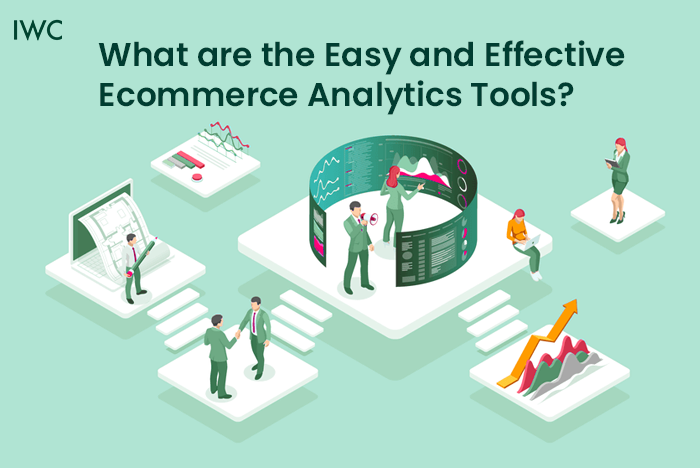What are the Easy and Effective Ecommerce Analytics Tools?

What are the Easy and Effective Ecommerce Analytics Tools? "In today's digital age, data is king, especially for ecommerce businesses. Analyzing customer behavior, tracking sales trends, and monitoring website performance are essential for making informed decisions and driving growth.
Fortunately, there are a plethora of ecommerce analytics tools available to help businesses collect, analyze, and leverage valuable data. When considering an eCommerce website, it's important to factor in the value these analytics tools can bring to your business strategy."
Introduction to Ecommerce Analytics
Ecommerce analytics refers to the process of collecting, analyzing, and interpreting data related to online retail activities. By leveraging ecommerce analytics tools, businesses can gain valuable insights into customer behavior, sales performance, marketing effectiveness, and more. These insights can inform strategic decisions, optimize marketing campaigns, improve website usability, and ultimately drive revenue growth.
The Importance of Ecommerce Analytics
Before diving into the specifics of ecommerce analytics tools, let's take a moment to understand why they're so crucial for online businesses:
1. Data-Driven Decision Making:
Ecommerce analytics provide actionable insights that enable businesses to make informed decisions based on real data rather than guesswork or intuition.
2. Understanding Customer Behavior:
By analyzing customer interactions with your website, you can gain a deeper understanding of their preferences, needs, and pain points, allowing you to tailor your offerings and improve the overall shopping experience.
3. Optimizing Marketing Efforts:
Ecommerce analytics tools help you track the performance of your marketing campaigns, identify which channels are driving the most traffic and conversions, and allocate your budget more effectively.
4. Measuring Performance:
Monitoring key performance indicators (KPIs) such as conversion rate, average order value, and customer lifetime value allows you to assess the health of your ecommerce business and identify areas for improvement.
5. Competitive Advantage:
By leveraging data to gain insights into market trends, customer behavior, and competitor strategies, you can stay ahead of the curve and outperform your rivals.
What are the Easy and Effective Ecommerce Analytics Tools?
Now that we understand the importance of ecommerce analytics, let's explore some of the top tools available on the market:
1. Google Analytics
Google Analytics is perhaps the most well-known and widely used analytics tool for ecommerce businesses. It offers a comprehensive suite of features that allow you to track website traffic, user behavior, and conversions. With Google Analytics, you can set up custom reports, track ecommerce transactions, analyze audience demographics, and much more. Plus, it's free to use, making it accessible to businesses of all sizes.
2. Adobe Analytics
Adobe Analytics is a robust analytics platform that provides advanced features for tracking and analyzing customer behavior across multiple channels. It offers real-time data collection, segmentation capabilities, and predictive analytics to help businesses gain deeper insights into their audience and drive personalized experiences. While Adobe Analytics comes with a higher price tag than some other tools, its advanced functionality makes it a valuable investment for larger ecommerce businesses.
3. Kissmetrics
Kissmetrics is a customer analytics platform designed to help businesses understand and engage their audience at every stage of the customer journey. It offers features such as customer segmentation, cohort analysis, and funnel tracking to identify opportunities for optimization and growth. Kissmetrics also provides insights into customer lifetime value, retention rates, and churn prediction, allowing businesses to focus their efforts on acquiring and retaining valuable customers.
4. Mixpanel
Mixpanel is a product analytics tool that focuses on tracking user interactions within web and mobile applications. It offers event-based tracking, funnel analysis, and A/B testing capabilities to help businesses understand how users engage with their digital products. While Mixpanel is primarily geared towards product analytics rather than ecommerce specifically, it can still be a valuable tool for ecommerce businesses looking to optimize their online shopping experience.
5. Hotjar
Hotjar is a behavior analytics and user feedback tool that allows businesses to visualize and understand how users interact with their website. It offers features such as heatmaps, session recordings, and feedback polls to help businesses identify usability issues, optimize conversion funnels, and improve overall website performance. Hotjar's intuitive interface and affordability make it a popular choice for ecommerce businesses of all sizes.
6. Crazy Egg
Crazy Egg is another heatmap and user behavior analytics tool that helps businesses understand how visitors interact with their website. It offers features such as heatmaps, scrollmaps, and A/B testing to identify areas of improvement and optimize website performance. Crazy Egg also provides insights into user engagement, conversion rates, and user journey analysis, making it a valuable tool for ecommerce businesses looking to enhance their online presence.
7. Shopify Analytics
For businesses operating on the Shopify ecommerce platform, Shopify Analytics provides built-in reporting and analytics features to track sales, customer behavior, and marketing performance. Shopify Analytics offers customizable dashboards, sales reports, and customer insights to help merchants make data-driven decisions and grow their online store. With seamless integration with the Shopify platform, it's an easy and convenient option for ecommerce businesses looking to streamline their analytics process.
Conclusion
In conclusion, What are the easy and effective ecommerce analytics tools? Ecommerce analytics tools play a critical role in helping businesses understand their customers, track sales performance, and optimize their online presence. Whether you're a small startup or a large enterprise, investing in the right analytics tools can provide valuable insights that drive growth and success. From Google Analytics to Adobe Analytics to specialized tools like Kissmetrics and Hotjar, there are plenty of options available to suit your business needs and budget. By leveraging the power of ecommerce analytics, you can gain a competitive edge in today's digital marketplace and take your online business to new heights.
“Boost your online sales with Indian Website Company (IWC), the leading ecommerce website development company in India. We specialize in creating custom, innovative designs to deliver standout shopping experiences. Let us help you convert clicks into customers!” Contact us today


